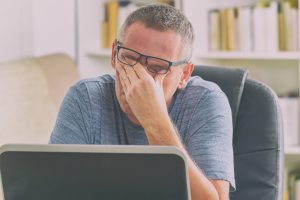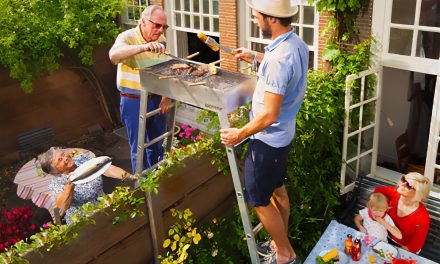In this article:
Aging is a natural part of life, but it doesn’t mean you have to say goodbye to a vibrant sexual drive. By understanding the factors that influence libido and making lifestyle adjustments, you can maintain or even improve your sexual health. Let’s explore how reconnecting with our primal roots can help.
What Lowers Your Sexual Drive as You Age?
As we age, several factors can contribute to a decrease in sexual drive:
- Lower General Energy: Aging often brings a decline in overall energy levels. This can be attributed to reduced ATP (adenosine triphosphate) production, which is essential for cellular energy.
- Lower Testosterone: Testosterone levels naturally decrease with age, affecting libido, muscle mass, and energy levels1.
- Poor Sleep: Quality sleep is crucial for hormone regulation and overall health. Poor sleep can lead to decreased testosterone levels and reduced energy2.
Low Energy Level
 Symptoms of Low Energy:
Symptoms of Low Energy:
- Fatigue and daytime drowsiness
- Lack of motivation
- Difficulty concentrating
How to Increase Energy:
- Exercise: Regular physical activity boosts ATP production and improves mitochondrial function. Our ancestors were constantly on the move, hunting and gathering, which kept their energy levels high. To read more about this, check out our articles about physical activity.
- Balanced Diet: Consuming a diet rich in whole foods, including lean proteins, healthy fats, and complex carbohydrates, supports energy production. Unlike today, our ancestors didn’t buy processed food from supermarkets, which often contain cheap ingredients stripped of their nutritional benefits. Instead, they ate fruits, vegetables, seeds, nuts, meat, and fish. Read our article “The easiest way to eat healthy” for more tips on how to create your own healthy diet.
- Adequate Rest: Ensure you get enough rest and recovery time to allow your body to repair and regenerate. Our ancestors went to sleep not long after sunset and woke up at dawn. As they lived near the equator, our ancestors typically got around 8 hours of sleep each night, both in summer and winter. It was only very recently, around 20,000 to 30,000 years ago, that humans started living in more northern latitudes, where the length of days varies significantly with the seasons.
Low Testosterone
 Symptoms of Low Testosterone:
Symptoms of Low Testosterone:
- Reduced sex drive
- Erectile dysfunction
- Loss of muscle mass
- Mood swings and irritability3
How to Check Testosterone Levels:
The best way is to consult with a healthcare provider for a blood test.
How to Increase Testosterone Levels:
- Strength Training: Engaging in resistance exercises can boost testosterone production. Primitive humans relied on their strength for survival, which naturally kept their testosterone levels high.
- Healthy Fats: Include sources of healthy fats like avocados, nuts, and olive oil in your diet, as they are essential for hormone production.
- Stress Management: Chronic stress can lower testosterone levels. Spending time with friends, your family, or a community of like-minded people is also proved to extend your health-span, and this is probably linked to lower cortisol and stress levels. Learn more about the important of socializing in our article “Gather and grow: the role of socializing in healthy aging”. Practices like meditation, yoga, and spending time in nature can help reduce stress.
Poor Sleep Quality
 Symptoms of Poor Sleep Quality:
Symptoms of Poor Sleep Quality:
- Waking up frequently during the night
- Feeling tired despite getting enough sleep
- Difficulty falling asleep4
- Reduced sex drive
How to Improve Sleep Quality:
- Establish a Routine: Go to bed and wake up at the same time every day to regulate your internal clock.
- Create a Sleep-Friendly Environment: Ensure your bedroom is dark, quiet, and cool. Primitive humans slept in natural environments, free from artificial light and noise, and that is what our body and mind are made for.
- Limit Screen Time: Reduce exposure to screens before bedtime, as blue light can interfere with melatonin production (the sleep hormone, inversely correlated to cortisol, which is also inversely correlated to testosterone production. So, more melatonin could help increasing testosterone too, even if not directly.)
Discover more about sleep quality in our article “There’s more to sunlight than you think“
The Holistic Benefits
By addressing these factors, not only will you boost your libido, but you’ll also improve your overall health. Increased energy, balanced hormones, and better sleep contribute to a healthier, more vibrant life, enhancing your sexual drive and well-being.
Embrace these natural strategies to reconnect with your biology and enjoy a fulfilling, active life at any age.
For more tips on maintaining health and youthfulness at any age, explore our comprehensive article:
The 10 most efficient, scientifically proven habits to stay young and fit at any age
References:
- Bupa UK. “How does age affect a man’s sexual health?” Retrieved from Bupa UK
- NHS. “Sleep problems – Every Mind Matters.” Retrieved from NHS
- Healthline. “Low Testosterone (Low T): Symptoms, Causes, and More.” Retrieved from Healthline
- Medical News Today. “Sleep deprivation: Causes, symptoms, and treatment.” Retrieved from Medical News Today
Disclaimer
Consult a health professional before making significant changes to your diet, exercise routine, or supplement regimen. The information provided in this blog is intended to convey the latest scientific research in an accessible manner. However, it does not replace the advice of a medical professional. Take your health conditions into account and consult a qualified healthcare provider to ensure that the decisions you make are safe and appropriate for your specific health needs. Ultimately, you are responsible for your own health and well-being.





